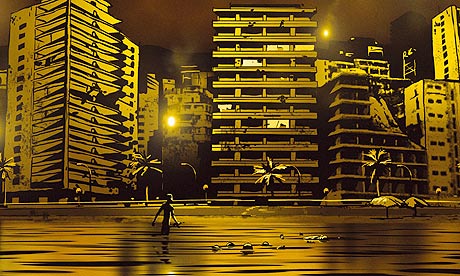My Blog List
Popular Posts
-
A favourite among many TZ aficionados, Nightmare at 20,000 Feet is memorable for starring a young William Shatner, and being one of the mos...
-
Coppola's other film from 1974, The Conversation is about the life of Harry Caul, a mercenary surveillance expert who begins to doubt th...
-
'Those people are our neighbours.' This episode is one of the most terrifying ever written for the Twilight Zone - and there isn...
-
The mythical lore of das vampyr has been incarnated on celluloid countless times dating back to Shreck's portrayal of the Nosferatu,...
-
I'm so glad my prejudice against Guy Ritchie gets to stay intact, because this is surely one of the worst films I've ever seen...
-
William Friedkin heaped praise on this film calling it 'maybe the best cop movie ever made', and I can understand why. As far as...
-
Monsters, along with District 9 and Moon is another recent reminder of how rich a genre the Sci-Fi is. I expect there to be allegorical ...
-
From celebrated director Guillermo del Toro and co-author Chuck Hogan comes The Strain, a modern day take on the vampire myth that combines ...
-
As both character and franchise, James Bond's cinematic legacy is one of the most famous and quite potentially infinite, at this poin...
-
First of all, I haven't read the graphic novel, despite being within feet of it, and I was wondering whether to postpone my viewing unti...
Total Pageviews
Tuesday, 3 January 2012
Waltz with Bashir
A documentary based on the massacres of Sabra and Shatila during the Lebanese war, Waltz with Bashir is a powerful, unique example of cinema acting as a medium for memory and self-reflection. The documentary follows its director, Ari Folman, in his search to recover the memories which had vanished about his time serving in the Israeli military, during which he had witnessed but could not recall the massacres. He interviews various soldiers who served with him and are the only witnesses who can confirm that he was present at that horrific event, and in narrative sequence, his memory eventually begins to unravel through the probing of his comrades'. It is highly intimate film-making made even more complicated by its situation around a war atrocity and told from an Israeli perspective, but it is nonetheless a fascinating immersion in Folman's personal quest to recover a defining moment of his past. Many of the memories of his interviewees are plagued with recurring dreams and nightmares about their experiences of the war, and articulates the irremovable mark war leaves upon the minds of its participants, and the nature of memory as a shifting filter which cannot fully process events quite as they are happening, or happened. In a wider sense the film engages with the effect of trauma upon the memory and the dis-associative effect between the witness and the event, and this is where the decision to use animation instead of real life footage is striking, apt, and provocative. It acts as a metaphor and a visual filter for Folman's memory, which is a form of representation itself, in the sense that it is an imagination of his history rather than a clear re-enactment of events, precisely because he could not remember them. Memory also becomes a politicised concept around events as inhumane and tragic as the Lebanese massacres, and it has not gone unnoticed that the film skirts around the Israelis' acknowledgement of responsibility over the genocide - the denial of memory in some ways might be interpreted as a defence mechanism, or a circumvention of guilt. Refusing to remember is sometimes an act with a deeply political agenda.
The animation also suggests a kind of hybrid documentary style, a new way of merging the real with the cinematic - a clash which is emphasised powerfully at the end when the film finally segues into real footage of the aftermath of the massacres. It is a startling change from the jaundiced but beautiful dreamscapes of the animation and it hits like a sledgehammer, leaving the visual residue of murdered bodies firmly in your mind. Rarely has a documentary film challenged its own medium to produce such a startling effect, and it is Folman's innovative decision which makes the film one of the greatest documentary films to have ever been made. While there are political wranglings over Waltz with Bashir, the essential examination of the atrocities of war and the physical and mental destruction produced by it is undeniably powerful.
Labels:
Animation,
Ari Folman,
Documentary,
Israel,
Lebanon,
Sabra,
Shatila,
Waltz with Bashir
Subscribe to:
Post Comments (Atom)








No comments:
Post a Comment